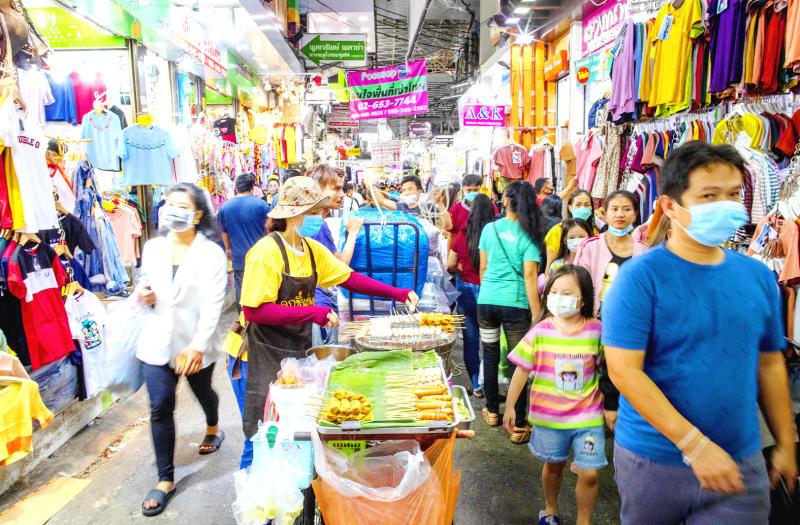Thailand’s economy saw its biggest annual contraction in 22 years and a record quarterly fall in the April-to-June period, as the COVID-19 pandemic and restriction measures hit tourism, exports and domestic activity, prompting an outlook downgrade.
Southeast Asia’s second-largest economy, which is heavily reliant on tourism and exports, shrank 12.2 percent in the second quarter from a year earlier, the worst contraction since the Asian financial crisis in 1998, data from the state planning agency showed.
That was better than a 13.3 percent slump seen in a Reuters poll, and compared with a downwardly revised 2 percent fall in the March quarter.

Photo: AP
On a quarterly basis, the economy shrank a seasonally adjusted 9.7 percent, the deepest on record, but better than the 11.4 percent drop forecast by economists.
The National Economic and Social Development Council cut its GDP forecast for this year. It now expects Thailand’s economy to shrink by 7.3 to 7.8 percent, having previously forecast a 5 to 6 percent contraction.
“Today’s economic release underscores the collapse of aggregate demand, both externally and internally,” Kasikornbank PCL capital markets research head Kobsidthi Silpachai said.
“Recovery will be lengthy as the shock to the demand and supply side has been the most severe in living memory,” he said.
While Thailand has lifted most lockdown restrictions after seeing no local transmission of COVID-19 for more than two months, its economy continues to suffer from an ongoing ban on incoming passenger flights and from tepid global demand.
The number of foreign visitors fell to zero in the April-to-June period, and Thailand has also shelved travel bubble plans amid new virus waves.
The planning agency expects only 6.7 million foreign tourists to come to Thailand this year, down 83 percent from last year’s record 39.8 million.
The downturn comes despite government efforts to support the economy with a 1.9 trillion baht (US$61 billion) fiscal stimulus package, while the central bank has also slashed interest rates by 75 basis points so far this year to a record low of 0.50 percent.
The impact of the lockdown and the travel ban is to continue to affect domestic consumption and investment, with anti-government protests adding to the risks, while exports would remain weak due to soft global demand, analysts say.
The state planning agency also cut its forecast for exports this year, expecting them to fall 10 percent versus a previous forecast for an 8 percent decline.

When an apartment comes up for rent in Germany’s big cities, hundreds of prospective tenants often queue down the street to view it, but the acute shortage of affordable housing is getting scant attention ahead of today’s snap general election. “Housing is one of the main problems for people, but nobody talks about it, nobody takes it seriously,” said Andreas Ibel, president of Build Europe, an association representing housing developers. Migration and the sluggish economy top the list of voters’ concerns, but analysts say housing policy fails to break through as returns on investment take time to register, making the

NOT TO WORRY: Some people are concerned funds might continue moving out of the country, but the central bank said financial account outflows are not unusual in Taiwan Taiwan’s outbound investments hit a new high last year due to investments made by contract chipmaker Taiwan Semiconductor Manufacturing Co (TSMC, 台積電) and other major manufacturers to boost global expansion, the central bank said on Thursday. The net increase in outbound investments last year reached a record US$21.05 billion, while the net increase in outbound investments by Taiwanese residents reached a record US$31.98 billion, central bank data showed. Chen Fei-wen (陳斐紋), deputy director of the central bank’s Department of Economic Research, said the increase was largely due to TSMC’s efforts to expand production in the US and Japan. Investments by Vanguard International

WARNING SHOT: The US president has threatened to impose 25 percent tariffs on all imported vehicles, and similar or higher duties on pharmaceuticals and semiconductors US President Donald Trump on Wednesday suggested that a trade deal with China was “possible” — a key target in the US leader’s tariffs policy. The US in 2020 had already agreed to “a great trade deal with China” and a new deal was “possible,” Trump said. Trump said he expected Chinese President Xi Jinping (習近平) to visit the US, without giving a timeline for his trip. Trump also said that he was talking to China about TikTok, as the US seeks to broker a sale of the popular app owned by Chinese firm ByteDance Ltd (字節跳動). Trump last week said that he had

STRUGGLING TO SURVIVE: The group is proposing a consortium of investors, with Tesla as the largest backer, and possibly a minority investment by Hon Hai Precision Nissan Motor Co shares jumped after the Financial Times reported that a high-level Japanese group has drawn up plans to seek investment from Elon Musk’s Tesla Inc to aid the struggling automaker. The group believes the electric vehicle (EV) maker is interested in acquiring Nissan’s plants in the US, the newspaper reported, citing people it did not identify. The proposal envisions a consortium of investors, with Tesla as the largest backer, but also includes the possibility of a minority investment by Hon Hai Precision Industry Co (鴻海精密) to prevent a full takeover by the Apple supplier, the report said. The group is